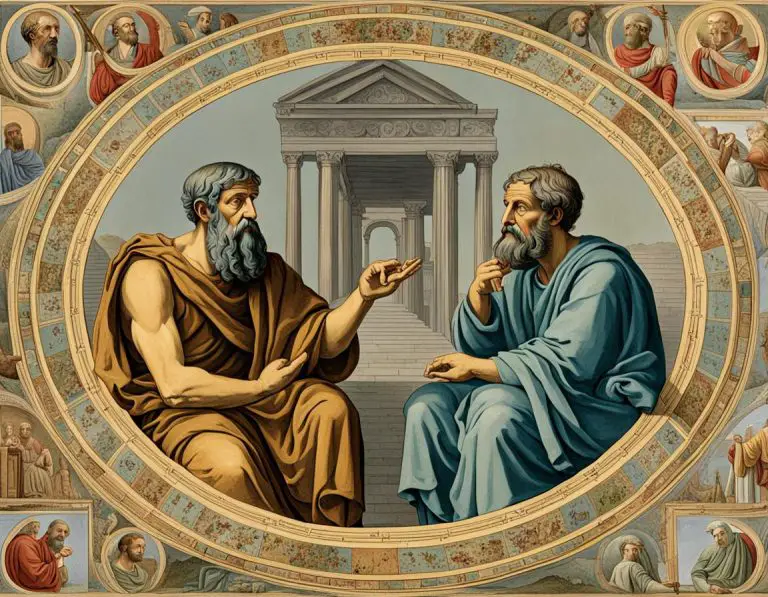Ethics and Virtue in Plato’s Philosophy
Ethics and virtue form the cornerstone of Plato’s philosophical framework, permeating his dialogues and shaping his vision of an ideal society. In Plato’s seminal work, “The Republic,” he delves into the concept of justice, arguing that individuals can achieve goodness and happiness by aligning themselves with the moral order of the universe. For Plato, virtue is not merely a set of behaviors but a reflection of one’s inner harmony and alignment with the divine.
In Plato’s ethical system, the pursuit of knowledge and wisdom is intricately linked with the cultivation of virtue. He believed that true happiness could only be attained through the development of one’s moral character and the understanding of the eternal truths that underpin reality. Through his dialogues, such as “Phaedo” and “Symposium,” Plato explores the nature of virtue, courage, temperance, and other moral virtues, inviting readers to contemplate the essence of goodness and its implications for human existence.
Exploration of Plato’s Notions of Virtue and Moral Goodness
Plato’s philosophy delves deep into the concepts of virtue and moral goodness, exploring what it means to lead a truly virtuous life. In his dialogues, Plato often depicted Socrates engaging in discussions with various interlocutors, delving into the nature of virtues such as courage, wisdom, justice, and temperance. Through these dialogues, Plato presents a series of arguments and counterarguments that ultimately aim to define what virtues are and how they should be pursued.
One of the central themes in Plato’s exploration of virtue is the idea that true knowledge leads to virtue. For Plato, the key to living a virtuous life lies in understanding the true nature of reality and the forms. He believed that by seeking knowledge and understanding of the forms, individuals could cultivate virtues such as wisdom and justice. This pursuit of knowledge was seen as essential for achieving moral goodness and living a life in accordance with the highest ideals of truth and virtue.
Dialogues of Plato
Plato’s dialogues are renowned for their philosophical depth and intricate discussions of various themes. Through the dialogue format, Plato presents profound ideas about truth, justice, morality, and the nature of reality. Each dialogue features Socrates engaging in conversations with different interlocutors, exploring different aspects of human life and thought.
The dialogues also serve as a platform for Plato to develop his Theory of Forms, where he posits that the material world is only a shadow of the true reality, which consists of abstract, ideal Forms. This concept is central to understanding Plato’s philosophy, as it underpins many of his arguments and beliefs about the nature of existence and knowledge. The dialogues of Plato continue to be studied and revered for their timeless insights into the human condition and the fundamental principles that govern our world.
Analysis of Major Dialogues and Their Philosophical Themes
Plato’s dialogues are known for their intricate philosophical themes that delve into various aspects of human existence and the nature of reality. Through dialogues such as “The Republic,” “Symposium,” and “Phaedo,” Plato explores concepts such as justice, love, courage, and the immortality of the soul. In “The Republic,” Plato grapples with the idea of an ideal society governed by philosopher-kings and ruled by reason, challenging readers to contemplate the nature of justice and the role of individuals in creating a harmonious community.
Furthermore, in “Symposium,” Plato examines the nature of love and beauty through a series of speeches given by prominent Athenian figures. This dialogue explores the different forms of love, ranging from physical desire to spiritual connection, and emphasizes the transformative power of love in guiding individuals towards a higher understanding of truth and goodness. Finally, in “Phaedo,” Plato delves into the concept of the immortality of the soul, presenting arguments for the soul’s eternal nature and its separation from the physical body upon death. Through these dialogues, Plato invites readers to contemplate timeless philosophical questions and deepen their understanding of the human experience.
Influence of Plato’s Philosophy
Plato’s philosophy has left an indelible mark on the development of Western thought. His ideas have profoundly influenced the fields of epistemology, metaphysics, ethics, and political theory. The enduring legacy of Plato’s works can be seen in the way his theories continue to shape philosophical discourse and inspire new generations of thinkers.
Moreover, Plato’s influence extends beyond the realm of philosophy. His teachings have also impacted other disciplines such as literature, psychology, and even theology. The emphasis on the pursuit of knowledge, the importance of moral virtue, and the quest for ultimate truths are themes that resonate across different areas of study, demonstrating the enduring relevance of Plato’s philosophical insights.
Impact of Plato’s Ideas on Western Philosophy
Plato’s philosophical ideas have left an indelible mark on Western philosophy, shaping the course of intellectual discourse for centuries to come. His emphasis on the importance of reason, ethical virtue, and the pursuit of truth has had a profound influence on subsequent philosophical thought. Many key concepts introduced by Plato, such as his theory of forms and the tripartite soul, continue to be central tenets in contemporary philosophical discussions.
Moreover, the dialogical method employed by Plato in his writings has inspired generations of thinkers to engage in Socratic dialogue and dialectical reasoning. This approach to philosophy as a collaborative and open-ended inquiry has had a lasting impact on the development of philosophical inquiry in the Western tradition. By fostering a spirit of critical inquiry and dialogue, Plato’s ideas continue to challenge and inspire philosophers to seek out deeper truths and insights into the nature of reality and human existence.
Related Links
Why did Plato emphasize The Tripartite Soul in his philosophy
Why is The Republic considered a significant work in Plato’s philosophy
